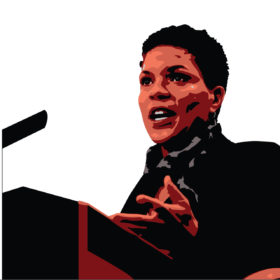When we think about black history, we think of people like Martin Luther King Jr., Frederick Douglass, Harriet Tubman, Thurgood Marshall and Jackie Robinson. But what about the next chapter, those today who are writing the history books of tomorrow? In honor of this year’s Black History Month, we’re predicting the future and looking at those prominent faces in African-American culture who are working hard to earn their successes and push for the continued progression of fair, just and respectful minority treatment.
The mark former President Obama has left on this country is undeniable, especially with today’s young people, women and minorities. For many he’s been a face of optimism, equality and progress. Not only is he the first African-American president of the United States, but he’s made it clear that he stands for and represents those beyond the racial and social bounds he’s familiar with. Obama may not be America’s most popular president on every front, but he’s done a lot of social good for the people of this nation.
For starters, he reformed our country’s health care legislation. The Affordable Care Act was implemented in 2010, and while many believe its roots to be unconstitutional, it has ensured that 32 million previously uninsured citizens now receive health coverage when they otherwise wouldn’t have it, according to an article by Paul Glastris, Ryan Cooper and Siyu Hu of The Washington Monthly. This fresh, universal system isn’t perfect, and as an executive order the Act might not last, but there are a lot of people who appreciate Obama’s intentions behind its mandated measures.
He’s also done right by the LGBTQ+ community. He repealed the “Don’t Ask, Don’t Tell” military policy, which, after its cancellation, has allowed gay men and women to serve openly in our country’s military. He also expanded protections for people from hate crimes, attempting to ensure the safety of those whose sexual orientations, religions, origins, etc. may seem to hold grounds for scrutiny, bullying and animosity. Furthermore, he helped champion marriage equality in the U.S., which was a huge deal, especially here in Utah where many conservatives fought hard to prevent its implementation.
Women have also been included in Obama’s political priorities. In 2009, he did away with Catch-22 in Equal Pay Laws, which has since granted women in the workforce the right to sue their employers for wage/salary discrimination, even if it occurred long before the filing of a suit. It is still the case that women make around 80 cents for every dollar that men make for the same work, according to aauw.org, but this enactment is intended to make it easier for women to earn equal treatment, and has made a statement that discrimination won’t be tolerated at any level, regardless of precedent.
In addition to the social progress he’s generated, he also did a lot throughout his presidency to help in aiding environmental sustainability by acknowledging carbon dioxide as a pollutant. Glastris, Cooper and Hu also reported on Obama’s investment in renewable technology, saying that, “As part of the 2009 stimulus, [he] invested $90 billion…in research on smart grids, energy efficiency, electric cars, renewable electricity generation, cleaner coal, and biofuels.” And he “issued an executive order in 2009 requiring federal agencies to make plans to soften their environmental impacts by 2020.”

The Williams sisters are each epitomes of success in sports. Not only have the two tennis-playing sisters long been regarded as some of the best female tennis players of our time, their abilities to succeed and then continue to grow on their successes have pushed them beyond the bounds of female athlete recognition and into the notable acknowledgements of “best tennis players of all time,” and then as some of the best athletes in history. The two have developed an “I have nothing to lose,” mindset deep into their careers, which has allowed them to break competitive opponents’ long-lasting winning streaks, and win tournament after tournament all over the world. At this point, Serena, according to Matt Trollope of ausopen.com, “has won literally everything you can win in the sport — all four Grand Slam titles in singles (and doubles) as well as a hefty swag of Olympic gold medals, a Fed Cup title and multiple trophies at the sport’s next-biggest events including the WTA Finals, Miami, Indian Wells and Rome.”
Before rising to fame, the two African-American sisters came from the rough Compton, California, and worked hard to essentially overtake a sport traditionally understood to be associated with wealthy white individuals. According to Harvey Araton of The New York Times, “the sisters have been credited with the introduction of women’s power tennis and the resulting surge of tall, hard-hitting players.” They’ve changed the game. In many ways they’ve shown that women can compete the same way men can — at the same caliber. Many of the Williams sisters’ most notable competitors haven’t beat them in over a decade, arguably because they’ve taken time off from their athletic careers to have and take care of families. And, had the Williams sisters failed to pursue their athletic careers to the extent that they have, it’s likely that women’s tennis wouldn’t have become and stayed as popular as it is today in the U.S., according to Harvey, as the two have generated more talk and rallied more competitive polarization internationally for the sport than ever before. U.S. fans seem to care more about our tennis representatives than they might have had Venus and Serena not reached the levels of success that they have.
The Williams sisters have changed the face of traditional tennis, but since their careers have unfolded and gained the recognition they deserve, the two have also done great things for women and African-Americans in today’s sports scene and beyond. They’ve shown that both ethnic minorities and women can compete, and compete well, in predominantly white sports and activities. Mindsets like these can extend beyond sports as well as today’s young people gain confidence to excel academically and politically in the arts and in sports, regardless of gender or race. These two are a positive inspiration for many.
 In the modern world of science Dr. Aprille Joy Ericsson is an aerospace engineer who received her Bachelor of Science degree from MIT before her Master’s, and was “the first African-American female to receive a Ph.D. in Mechanical Engineering from Howard University,” according to her ALLSTAR mentor profile from allstar.flu.edu. Some points of recognition she has earned are “the 1997 Women in Science and Engineering Award for ‘Best Female Engineer,’” as well as her being “featured on the NBC Nightly News Series ‘Women to Watch,’ while recording “in history books honoring African-American Women in Space and Science.” She has also been successfully published in many academic and scientific journals.
In the modern world of science Dr. Aprille Joy Ericsson is an aerospace engineer who received her Bachelor of Science degree from MIT before her Master’s, and was “the first African-American female to receive a Ph.D. in Mechanical Engineering from Howard University,” according to her ALLSTAR mentor profile from allstar.flu.edu. Some points of recognition she has earned are “the 1997 Women in Science and Engineering Award for ‘Best Female Engineer,’” as well as her being “featured on the NBC Nightly News Series ‘Women to Watch,’ while recording “in history books honoring African-American Women in Space and Science.” She has also been successfully published in many academic and scientific journals.
She’s done a lot of good showcasing her abilities in the sciences as an engineer working for NASA’s Goddard Space Flight Center in Maryland. Last year NASA awarded her with the Washington Award, which recognizes those engineers who have “pre-eminently promoted the happiness, comfort and well-being of humanity,” according to nasa.gov. Others who have received the award include Bill Nye and Neil Armstrong, the site reports. During her acceptance speech she took the time to reflect on the educational and inspiring speaking she’s done all over the world over the course of her career, appreciating the chances she’s had to work with other brilliant minds and hopefully positively influence those in bloom. It has meant a lot to her to take the time to get through to the next generation of inventive and innovative people in order to further research and progress on issues like the creation of the universe and more direct problems like climate change. Her mind and abilities have had a huge impact in her field. She’s been a motivating role model, as well as an admirable advocate of progress in the engineering sciences.
 A personal favorite of mine is Michelle Alexander. She joins worthy disciplines as a well-known and “highly acclaimed civil rights lawyer, advocate, and legal scholar,” according to newjimcrow.com, a site developed after the publication of her book “The New Jim Crow: Mass Incarceration in the Age of Colorblindness.” She’s done a lot to showcase that discrimination still exists in today’s America and drastically hinders African-Americans’ abilities to excel as minorities in today’s society due to the fact that they’re unfairly and unjustly targeted to satisfy malicious white majority social, political and economic agendas.
A personal favorite of mine is Michelle Alexander. She joins worthy disciplines as a well-known and “highly acclaimed civil rights lawyer, advocate, and legal scholar,” according to newjimcrow.com, a site developed after the publication of her book “The New Jim Crow: Mass Incarceration in the Age of Colorblindness.” She’s done a lot to showcase that discrimination still exists in today’s America and drastically hinders African-Americans’ abilities to excel as minorities in today’s society due to the fact that they’re unfairly and unjustly targeted to satisfy malicious white majority social, political and economic agendas.
Alexander is an extremely successful academic, graduating from Vanderbilt University and Stanford Law School. She has also clerked for Supreme Court Justices. Over the course of her career, Alexander has worked with non-profit organizations as an advocate, and has worked as a private litigator for firms handling cases regarding race and gender discrimination. She’s devoted a lot of her recent time to freelance writing. She has won sponsorships and honors for “The New Jim Crow,” and the book “has been featured in national radio and television media outlets, including MSNBC, NPR, Bill Moyers Journal, Travis Smiley, C-SPAN, and the Washington Journal.” Her hefty credentials and desire to positively impact minority statuses, especially as they pertain to African-Americans, has made her one of the most notable faces in today’s African- American advocacy scene.



Ali Reaves • Feb 26, 2017 at 7:17 pm
Great article. It was a pleasure working with Dr. Aprille Joy Ericsson at NASA who always reminded me to smile and to not look so serious all the time.
Ali Reaves • Feb 26, 2017 at 7:17 pm
Great article. It was a pleasure working with Dr. Aprille Joy Ericsson at NASA who always reminded me to smile and to not look so serious all the time.